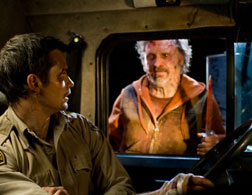The Crazies
What's missing from the latest well-made horror film.
After you've seen The Crazies, get a dose of sanity with our Spoiler Special discussion:
You can also download the program here, or you can subscribe to the Spoiler Special podcast feed via iTunes or directly with our RSS feed.
If a horror movie can be described, without insult, as "comforting," that would be the word for Breck Eisner's The Crazies (Overture Films), an adaptation of the 1973 George Romero film about a murderous contagion spreading through a small town. The Crazies scares you in exactly the way you think it's going to scare you; it hits all the expected schlock-horror beats but still manages to conjure a scream when the bad guys loom up from the shadows. It isn't a period-obsessed riff on '70s gore or a somber deconstruction of it, just a modestly budgeted and not terribly ambitious updating of the formula. That sounds like faint praise, but I quite liked The Crazies. It lacks the fevered sincerity (and the political timeliness) of Romero's original, but it's tightly scripted, cleverly cast, consistently scary, occasionally funny—everything you could ask from a well-made and completely unnecessary remake.
In a small Iowa farming community called Ogden Marsh, Sheriff David Dutton (Timothy Olyphant) is watching a high-school baseball game when he notices the former town drunk wandering onto the field, armed with a shotgun and glazed stare. Assuming the man has fallen off the wagon, Dutton approaches him and, after a tense negotiation, is forced to kill him in self-defense. Dutton is consumed with guilt—even more so after it turns out the victim had no alcohol in his bloodstream but was simply and inexplicably compelled to go on a killing spree. Other townspeople soon begin falling victim to the same mysterious malady. Out of nowhere, their skin goes gray, their gaze fixed, and they grab the nearest death-dealing implement—gun, pitchfork, or, in a pinch, gasoline and a match—and start doing their neighbors in.
The sheriff, investigating with his loyal deputy, Russ (an excellent Joe Anderson), discovers a crashed plane submerged in the river that provides the town's water supply. Biological weapon, government cover-up, something something—long story short, the crazies want to kill us all. (Though the director has pointed out the difference between crazies and traditional zombies, their narrative function is basically identical: Both are blank-eyed, clammy-skinned killing machines whose evil spreads by contagion.) Within days, the town of Ogden Marsh is in flames, and government troops in hazmat suits have moved in to herd the uninfected citizens into camps. The sheriff, along with his deputy; his pregnant wife, Judy (Radha Mitchell); and a teenage girl (Danielle Panabaker), must find a way to escape the containment zone and make their way to safety in Cedar Rapids. Their journey is beset by obstacles both horrific and comic and a few nifty set pieces, including a very screamy ride through an old-fashioned drive-through car wash.
In many ways, The Crazies fits into the trend of nostalgic, "artisanal" horror we talked about earlier this year in the "Movie Club": small movies like Drag Me to Hell, Paranormal Activity, and The House of the Devil that rely more on old-school psychological suspense than CGI special effects and extreme gore. It's not just that directors are mining the thrillers of the past for story ideas (though that's as true of horror as it is of every other innovation-starved genre). There seems to be a genuine interest in returning to the feel of B-movies of the '70s and '80s, with their tiny budgets and big ideas. The original Crazies and, to a greater degree, Romero's Night of the Living Dead movies were as much about race relations, consumerism, and the fraying of the social fabric as they were about the fear of brain-eating zombies.
This Crazies was co-written by Scott Kosar, who's making a career of dusting off period horror: He scripted the remakes of both The Texas Chainsaw Massacre and The Amityville Horror. (Please tell me no one is going to touch Phantasm.) Kosar and Eisner (who's the son of the former Disney head Michael Eisner) understand the mechanics of the spook-out, and they go out of their way to establish a specific sense of place and a solid cast of characters before setting loose the circular-saw-wielding morticians.
But the filmmakers seem less clear on what really made those early Romero films great, which is something that, by definition, can't be re-created by any level of loving craftsmanship: They were timely. For all their ragged editing and over-the-top hysteria, those zombie flicks channeled and allegorized the anxieties of the post-civil rights (and later, post-Watergate) eras, and whatever our cultural paranoias and phobias may be today, they're no longer the same. To make horror movies that matter, filmmakers have to think about what scares them—not just in the movie theater, but in the far more terrifying world outside.
Slate V: the critics on The Crazies and other new releases.
Become a fan of Slate on Facebook. Follow us on Twitter.

